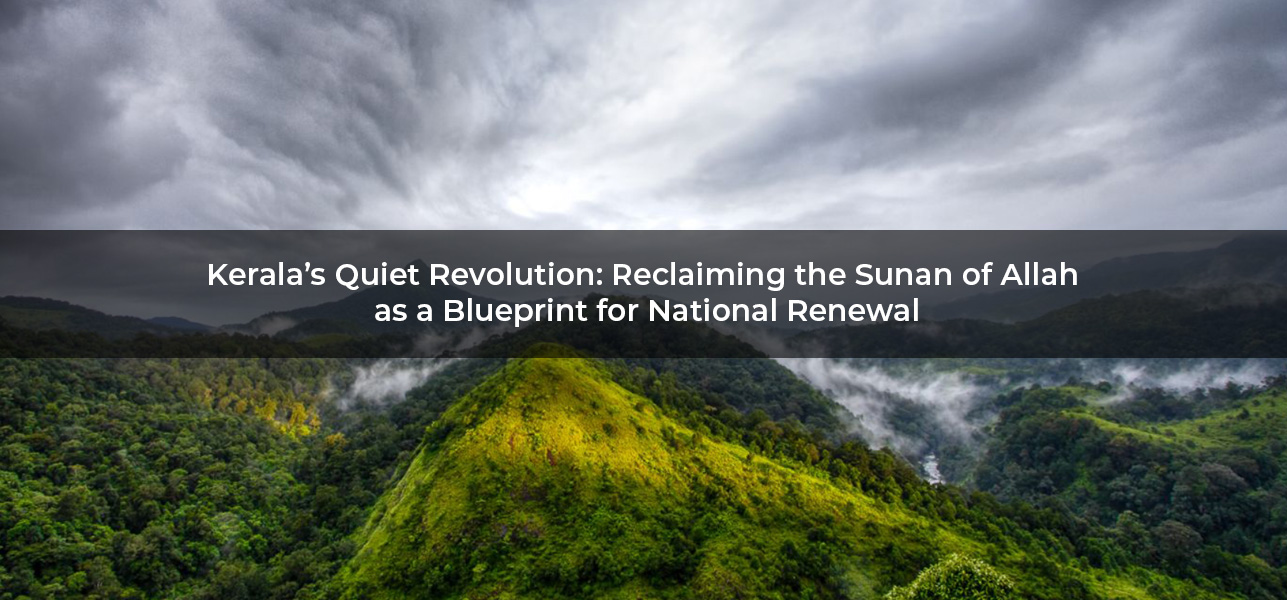Divine laws don’t expire; they await reapplication.
While much of the Muslim world debates the failures of governance, one community quietly ignited a renaissance. Kerala, a small Indian state where Muslims form a minority, has achieved a societal transformation with high literacy, thriving startups, and inclusive leadership. This was not a political miracle, it was a methodical reactivation of Sunan Allāh: the divine operating principles encoded in the Qur’an.
What Kerala accomplished offers not only inspiration, it offers a blueprint for countries like Pakistan, Bangladesh, Egypt and others seeking holistic reform grounded in faith, merit, and justice.
From Medina to Kerala: The Lost Legacy of Prophetic Governance
The Constitution of Medina, authored by the Prophet Muhammad ﷺ in 622 CE, was the world’s first pluralistic civic charter. It created an Ummah, a united community of Muslims, Jews, and pagans, based not on uniformity but shared principles of consultation (shūrā), justice (ʿadl), and trust (ʿahd). It was a practical implementation of divine law.
This Qur’an-based governance model was later abandoned when the Umayyad Dynasty introduced inherited power, centralized control, and
tribal exclusivity. Instead of divine principles guiding society, secular structures took over, and the decay began.
What Are the Sunan of Allah?
These are immutable laws embedded in the Qur’an, patterns of cause and effect that shape societal development and civilizations. When followed, they enable prosperity, stability, and justice. When ignored, they lead to collapse.
Key Sunan of Allah
- Merit-Based Leadership: Leadership must be earned through knowledge and strength, Qur’an 2:247, 28:26
- Gradual Change: Transformation unfolds step by step, Qur’an 13:11
- Accountability of Nations: Moral decay leads to societal collapse, Qur’an 17:16
- Justice & Equity: Societies are sustained through fairness, Qur’an 16:90 Consultation (Shūrā): Governance through collaboration, Qur’an 42:38
- Knowledge-Seeking: Literacy and inquiry empower communities, Qur’an 58:11
- Inclusivity: Diversity is a divine sign, not a weakness, Qur’an 49:13 Reciprocity: What you give is returned to you, Qur’an 2:261
- Women’s Dignity: Societies thrive when women are honored and empowered, Qur’an 9:71, 33:35
- These laws aren’t theoretical, they are replicable principles for policymaking.
Kerala’s Case Study: When Sunan Became System
Kerala’s transformation was led by grassroots institutions such as Kerala Nadvathul Mujahideen (KNM) and Jamaat-e-Islami Hind. These organizations activated three foundational Sunan:
- Mandated Literacy + Qur’an-STEM Integration
Inspired by the Prophet’s ﷺ command to seek knowledge, Kerala blended Qur’anic instruction with modern science. In many schools, Qur’an classes follow robotics labs, affirming that faith and reason are partners, not rivals.
- Localized Zakāh for Human Development
Zakāh was not confined to mosque upkeep. Funds were redirected to vocational centers, women’s colleges, and STEM-focused schools, creating an ecosystem of empowerment.
- Revived Female Leadership
Drawing from the legacy of Umm al-Dardā’ and other scholars, Kerala normalized women as principals, professors, and business leaders. Today, 40% of Muslim startups in the state are led by women.
Result: Kerala’s Muslims now enjoy a 94% literacy rate (far surpassing India’s national average of 72%), high social cohesion, and thriving interfaith relations.
A Quiet Revival Without a Declaration
Kerala’s leaders never publicly announced that they were reviving Sunan Allāh as a strategy for societal change. Yet their choices, universal education, zakāh for development, female empowerment, mirror the timeless laws laid out in the Qur’an. This quiet revolution is profoundly telling: the Sunan don’t require grand declarations, they require alignment and action. And when enacted, even silently, they deliver what God promised: progress, balance, and renewal.
What We Lost, and Can Regain
Abandoning the Sunan led to:
- Power without merit
- Governance without consultation
- Patriarchy over inclusion
- Ritual memorization instead of inquiry
- Sectarianism over shared purpose
Reapplying the Sunan offers:
- Transparent, merit-based leadership
- Education that bridges Qur’an and science
- Zoning zakāh into human capital
- Women as central agents of change
- Pluralistic communities built on values, not divisions
Kerala shows us that the “Golden Age” wasn’t about geography, it was about alignment with God’s laws.
Toward Pakistan, Bangladesh, and Egypt: Pathways for Replication
These nations possess deep spiritual heritage, vibrant youth populations,
and latent resources. Here’s how to activate the Sunan model:
For Pakistan
- Disrupt Feudalism: Apply 2:247 to promote merit-based leadership across
- Zakāh Reform: Create a zakāh-fed education fund focused on rural women and STEM.
- Curriculum Revival: Structure Qur’an learning after digital and design labs.
For Bangladesh
- Empower Rural Women: Inspired by 9:71, fund women-led cooperative
- Shūrā in Local Governance: Mandate participatory village budgeting based on 42:38.
- Fusion Education Models: Build institutions where Qur’anic ethics meet engineering.
For Egypt
- Reinvigorate Al-Azhar’s Role: Restore its independence and revive its legacy as a hub of Qur’anic reasoning and global scholarship.
- Decentralize Religious Authority: Encourage community-led Qur’an-STEM schools that reflect the Sunnah of knowledge-seeking (58:11).
- Zakāh for Urban Renewal: Redirect zakāh toward rebuilding underserved neighborhoods, vocational training, and women’s entrepreneurship.
- Reclaim the Sunnah of Justice and Consultation: Reform municipal governance to reflect ʿadl (16:90) and shūrā (42:38), ensuring transparency and public trust.
Egypt’s historical role as a beacon of Islamic thought makes it uniquely positioned to lead a new wave of prophetic governance, if it reactivates the very laws that once made it flourish
Final Reflection: Naming the Revival and Breaking the Status Quo
As a concerned observer, I consider it my responsibility to bring this quiet revolution to the attention of the Muslim world. Kerala’s success is more than a regional achievement, it is living evidence that divine laws, when reactivated sincerely and systemically, can regenerate a civilization.
Naming this revival matters. Framing it as a reapplication of Sunan Allāh empowers other nations to see what’s possible.
This may be the necessary first step toward breaking the status quo, dismantling inherited colonial paradigms, and building a new civilization where all segments of society work in harmony, inspired by revelation and rooted in shared responsibility.
Divine laws don’t expire. They’re simply waiting for a generation bold enough to believe, and act.
